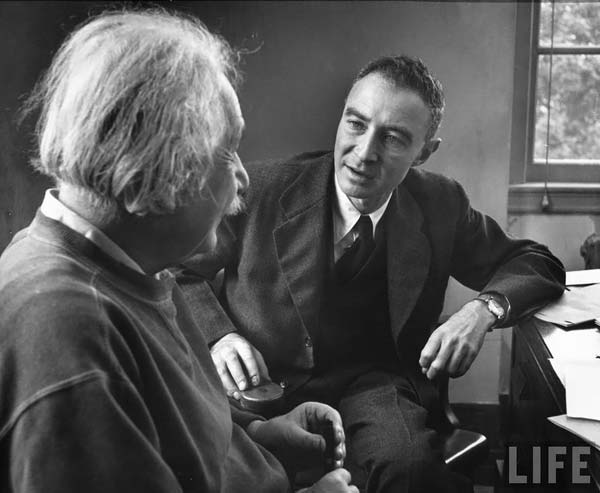http://en.wikipedia.org/wiki/J._Robert_Oppenheimer

quotes:
"The history of science is rich in the example of the fruitfulness of bringing two sets of techniques, two sets of ideas, developed in separate contexts for the pursuit of new truth, into touch with one another."
"I can't think that it would be terrible of me to say — and it is occasionally true — that I need physics more than friends."
"There must be no barriers to freedom of inquiry ... There is no place for dogma in science. The scientist is free, and must be free to ask any question, to doubt any assertion, to seek for any evidence, to correct any errors. Our political life is also predicated on openness. We know that the only way to avoid error is to detect it and that the only way to detect it is to be free to inquire. And we know that as long as men are free to ask what they must, free to say what they think, free to think what they will, freedom can never be lost, and science can never regress."
"We knew the world would not be the same. Few people laughed, few people cried, most people were silent. I remembered the line from the Hindu scripture, the Bhagavad-Gita. Vishnu is trying to persuade the Prince that he should do his duty and to impress him takes on his multi-armed form and says, "Now I am become Death, the destroyer of worlds." I suppose we all thought that, one way or another."
"I believe that through discipline, though not through discipline alone, we can achieve serenity, and a certain small but precious measure of the freedom from the accidents of incarnation, and charity, and that detachment which preserves the world which it renounces. I believe that through discipline we can learn to preserve what is essential to our happiness in more and more adverse circumstances, and to abandon with simplicity what would else have seemed to us indispensable; that we come a little to see the world without the gross distortion of personal desire, and in seeing it so, accept more easily our earthly privation and its earthly horror — But because I believe that the reward of discipline is greater than its immediate objective, I would not have you think that discipline without objective is possible: in its nature discipline involves the subjection of the soul to some perhaps minor end; and that end must be real, if the discipline is not to be factitious. Therefore I think that all things which evoke discipline: study, and our duties to men and to the commonwealth, war, and personal hardship, and even the need for subsistence, ought to be greeted by us with profound gratitude, for only through them can we attain to the least detachment; and only so can we know peace."
"Everyone wants rather to be pleasing to women and that desire is not altogether, though it is very largely, a manifestation of vanity. But one cannot aim to be pleasing to women any more than one can aim to have taste, or beauty of expression, or happiness; for these things are not specific aims which one may learn to attain; they are descriptions of the adequacy of one's living. To try to be happy is to try to build a machine with no other specification than that it shall run noiselessly."
"We may be likened to two scorpions in a bottle, each capable of killing the other, but only at the risk of his own life."
"But when you come right down to it the reason that we did this job is because it was an organic necessity. If you are a scientist you cannot stop such a thing. If you are a scientist you believe that it is good to find out how the world works; that it is good to find out what the realities are; that it is good to turn over to mankind at large the greatest possible power to control the world and to deal with it according to its lights and its values."





 Reply With Quote
Reply With Quote
 , LIE, ENTj logical subtype, 8w9 sx/sp
, LIE, ENTj logical subtype, 8w9 sx/sp
 vs
vs 
 Also, arsenals are definitely internal statics of a "warring world" object.
Also, arsenals are definitely internal statics of a "warring world" object. more than
more than 






